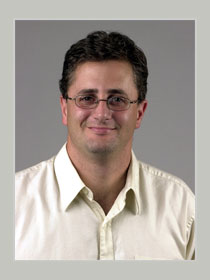
The Bill Lane Center for the American West, Stanford University

2008 Winner of the Risser Prize for Western Environmental Journalism
Anton Caputo
San Antonio Express-News
• High seas eroding Texas coastline 
• Global warming likely to mean more droughts and more floods 
• Farmers suffer from heat, water loss 
• Birds' patterns changing in face of global warming 
• How Texas is responding to global warming, The race is on to save the state's wetlands 
Two other entries were recognized with special citations. Kim McGuire, of the Denver Post, was recognized for her series, "Coal-bed Methane Water," and Hannah Nordhaus was recognized for her story in High Country News, "The Silence of the Bees." McGuire is now an environment reporter at the St. Louis Post-Dispatch.
- "Coal-bed Methane Water", Denver Post

- "The Silence of the Bees", High Country News

The award and citations were announced by James Bettinger, director of the John S. Knight Fellowships for Professional Journalists. The Knight Fellowships program and the Bill Lane Center for the American West co-sponsor the award. Caputo will be invited to Stanford later in the year to participate in a symposium focusing on the issues raised in his series.
Caputo's series documented the current and looming effects of climate change in a local context - lost wetlands and vanishing beaches, decreasing cropland and wildlife habitat, and wildly unpredictable water supplies. One judge said Caputo's reporting "resulted in a razor-sharp portrayal of the critical scientific underpinnings of climate change...The series coupled this outstanding scientific reporting with real-world impacts on real (and local) people and institutions."
Caputo has covered environmental issues for the San Antonio Express-News since August 2004, when he joined the newspaper. Before moving to Texas, Anton worked for the Pensacola (Florida) News Journal, the Northwest Florida Daily News and the Columbia Basin Herald in Washington. His environmental coverage has been honored by the Society of Environmental Journalists and the Investigative Reporters and Editors.
McGuire's series documented controversy over the use of water "byproducts" from coal-bed methane gas mining - a subject that links two major Western issues, energy and water. One judge described it as "powerful reporting on a previously overlooked aspect of the oil and gas boom in the Rockies."
Nordhaus's story, subheadlined, "The Perilous Existence of a Modern Beekeeper Amid a Great Bee Die-Off," chronicled beekeeper John Miller as he contends with the collapse of his industry. Said one judge, "The ease with which this piece puts pen to paper -- and leaves lasting images in the reader's mind -- belies the enormous amount of work that went into her exceptional reporting."
The prize is given in the name of James V. Risser, a two-time Pulitzer Prize winner and director emeritus of the Knight Fellowships program.
Judges of the contest were John Daley, a reporter at KSL-TV, Salt Lake City and a 2007-08 Knight Fellow; Juliet Eilperin, national environmental reporter at the Washington Post; Terry Root, professor of Biological Sciences and a Freeman Spogli Institute Senior Fellow at Stanford, Barbara Serrano, managing editor of the Yakima (Washington) Herald-Republic, and Bud Ward, editor of the Yale Forum on Climate Change and the Media.
The Risser Prize was established in 2005 and is open to print, broadcast and online journalists writing about environmental issues in western regions of Canada, Mexico and the United States. The prize was established in recognition of Risser's outstanding journalism career and his leadership of the John S. Knight Fellowships for Professional Journalists from 1985 until his retirement in 2000. Risser is a former Washington bureau chief of the Des Moines Register, and he wrote frequently and incisively about environmental issues. He has had a particular interest in those issues as they affected the western United States.
In judging the awards, preference is given to stories about environmental issues that are distinctively Western. The judges placed a premium on stories that explained complicated situations, stories that exposed undiscovered or covered-up problems and stories with ramifications beyond the immediate dimensions of the issue being covered.
The Knight Fellowships program annually brings 12 outstanding mid-career U.S. journalists and as many as nine from other countries to study at Stanford in a one-year program. More than 700 journalists have studied at Stanford under the program since it began in 1966. James Bettinger is director of the program. Dawn E. Garcia is deputy director.
The Bill Lane Center for the American West was established at Stanford in 2002. In 2005 it was endowed by L. W. "Bill" Lane Jr., '42. The Center is dedicated to advancing scholarly and public understanding of the past, present, and future of western North America. It supports research, teaching, and reporting about western land and life in the United States, Canada, and Mexico.
Anton Caputo won the $3,000 prize for his five-part series, "Climate Change Hits Home," which described how global warming is affecting the Gulf Coast and South Texas.
Texas Tribune, ProPublica

The Desert Sun and USA Today

CPI, InsideClimate News, The Weather Channel

The Seattle Times

The Sacramento Bee

High Country News

5280 Magazine

Seattle Post-Intelligencer

What Went Wrong?
The Seattle Times

San Antonio Express-News

The Los Angeles Times

High Country News



